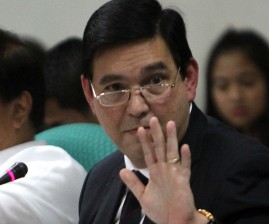MANILA, Philippines – Aside from the controversial priority development assistance fund (PDAF), the proposed P2.268-trillion national budget for 2014 contained billions of “lump sum” allocations , prompting a Senate leader to call for a line-item budgeting of these allotments.
Senate Pro Tempore Ralph Recto identified at least 10 items worth P96 billion in next year’s budget that he said must be considered for “line-item budgeting” – meaning the cost and the location of every project should be made explicit and clear.
These are allocations for the Department of Agriculture’s P12 billion Farm-to-Market Road Fund ; Department of Education’s P37.7 billion Classroom Construction, Repair, Replacement Fund; Department of Public Works and Highway’s P2.5 billion Right-of-Way Fund; Department of Public Works and Highway’s P11.3 billion request for Various Infrastructure Including Local Projects; and Department of Public Works and Highways’ P1.9 billion Feasibility Studies, Engineering Designs Fund.
Department of Social Welfare and Development’s P2.5 billion request for Sustainable Livelihood Programs; Payapa at Masaganang Pamayanan (PAMANA) Program in various agencies totaling P7.2 billion ; Department of Health’s P13.3 billion Health Facilities Enhancement Program; Department of Agriculture’s P5.1 billion Irrigation Fund; and E-Government Fund, P2.5 billion
“If PDAF would be scrapped and rechanneled to social services then we must have a format on how to do it in the most transparent manner possible,” Recto said in a statement on Tuesday.
Under the current budgeting practice, he said, many multi-billion-peso expenditures are authorized in the budget “through a few sentences, in language so economical that you can fit them in one Tweet.”
But Recto said he does not see any problem in the submission of the details of the lump sums, since the budget was supposedly built from scratch or what is called as zero-based budgeting.
“Zero-based budgeting calls for piece-by-piece assembly of the budget. The assumption is that line-items are pieced together. If this is the case, we are just asking the agencies to submit to us the basis, the bill of particulars, they used in coming up with their budget request,” he said.
Recto said the P2.4 billion E-Commerce Fund should be fleshed out because its “sparse authorization language” as it merely states that it will be for “information technology projects.”
As to the DepEd’s request for classrooms, the senator said, “there will be no harm in listing where the 43,183 classrooms will be built or repaired so children studying in crowded rooms will be assured that relief is on the way and so that people on the ground can monitor their construction.”
In the case of the DPWH’s P11.3 billion request for various infrastructures, Recto said Congress will be remiss in its duties “if this will be approved sans specifics.”
He said the Right-of-Way allotment of the DPWH must also be fleshed out complete with names of payees so that the public will know the cost of private lots expropriated.
“The R-O-W fund at P2.5 billion is 10 percent of the PDAF, and we can’t have a situation wherein the latter is itemized but the former is a blank check.”
On the Health department’s P13.3-billion request for “health facilities’ enhancement,” Recto said, “It is but fair to ask a listing of the 962 barangay (village) health stations, 1,265 rural health units, 561 local government hospitals and 69 DOH-run hospitals that will benefit from this fund.”
He said it was also incumbent upon the Agriculture department to list the villages where the 1,500 kilometers farm-to-marker road worth P12.5 billion would be built as well as the length and cost of each.
Recto said the proposed P7.2- billion PAMANA program, which was scattered over 10 agencies, lacks details “and it would serve the purposes of transparency if details would be supplied.”
“There is no reason why agencies can’t come up with details because if the DSWD can compile a registry of 21.5 million individual beneficiaries of CCT (Conditional Cash Transfer), complete with address, and even the body weight of hundreds of thousands of children, then there is no reason why an agency like the DA can’t tell us where the irrigation canals will be built,” he pointed out.
Recto said the details of the itemized budget need not be incorporated into the General Appropriations Act but it could be used as an annex or a reference material, which should be accessible to the public.
The senator raised this issue of line-item budgeting at the hearing of the Senate committee on finance attended by Budget Secretary Florencio Abad, among others.
Abad, responding to Recto’s queries, informed the committee that they had given the agencies until October 15 this year to submit their “disaggregation” of their lump sum allocations.
He said the agencies that can’t comply with the requirement would be included in the “negative list,” meaning they could not immediately implement their programs or if there were delays in the submissions, they might not be able to obligate their funds.
“And therefore, we can take away their appropriation and augment the budget of certain agencies…” Abad said.


